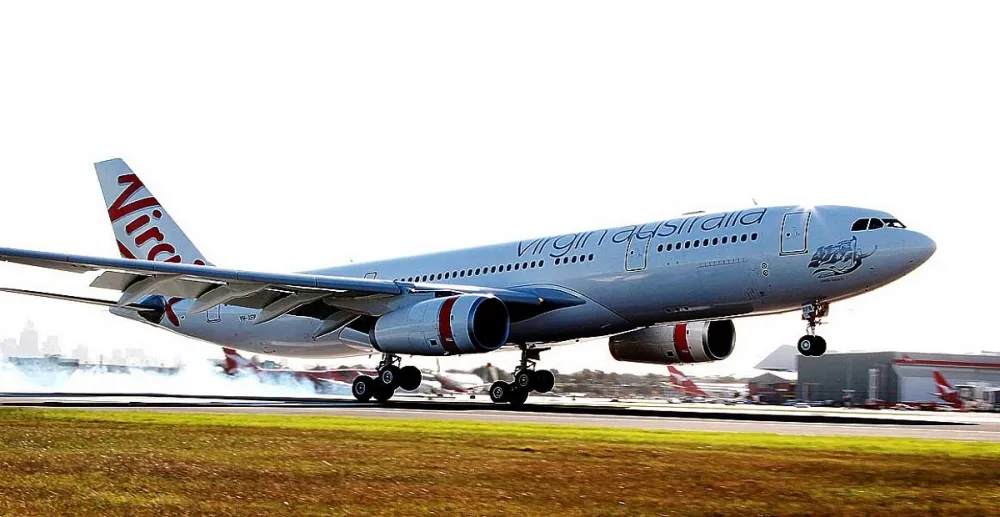
Chinese move on Virgin Australia
Jul 28, 2016

In a strategic move to expand its footprint in the aviation industry, a Chinese consortium has made a significant investment in Virgin Australia. This partnership aims to enhance the airline's operational capabilities and market presence, particularly in the Asia-Pacific region. The collaboration is expected to bring in capital for fleet expansion and service improvements, catering to a growing demand for air travel. Additionally, this investment reflects the increasing interest of Chinese investors in the Australian market, highlighting the potential for economic ties and tourism growth between the two nations.
In recent developments, the "Chinese investment" landscape has taken a significant turn with the move on "Virgin Australia". This shift has attracted the attention of investors, industry analysts, and travel enthusiasts alike. Understanding the implications of this acquisition requires a closer look at the "financial dynamics", "market conditions", and the future trajectory of both "Virgin Australia" and the broader aviation sector.
The Background of Virgin Australia
Founded in 2000, "Virgin Australia" has grown to become one of the leading airlines in the Australian market. It has established a reputation for offering competitive prices and a wide range of services, attracting both domestic and international travelers. The airline has faced various challenges over the years, including financial difficulties exacerbated by the COVID-19 pandemic. As a result, the recent interest from "Chinese investors" could signify a turning point for the airline.
Chinese Investment Trends
Chinese investments in foreign markets have been a hot topic over the last decade, particularly in the aviation and travel sector. With a growing middle class and an increasing demand for international travel, "Chinese investors" are keen to capitalize on lucrative opportunities. The move on "Virgin Australia" is reflective of this trend, as it not only represents a strategic acquisition but also opens up potential avenues for expanding the "market reach" of the airline.
Chart: Overview of Chinese Investments in the Aviation Sector
| Year | Investment Amount (USD) | Notable Acquisitions |
|---|---|---|
| 2015 | 5 Billion | HNA Group acquires a stake in Hilton |
| 2016 | 7 Billion | China Eastern Airlines invests in Qantas |
| 2020 | 3 Billion | Chinese interests in Virgin Australia |
| 2023 | Unknown | Potential acquisition of Virgin Australia |
Impact on Virgin Australia
The acquisition of "Virgin Australia" by "Chinese investors" is expected to bring several changes to the airline’s operations. Firstly, there could be an influx of capital, which is crucial for rebuilding the airline post-pandemic. This funding could help enhance fleet capabilities, improve customer service, and expand route networks both domestically and internationally.
Additionally, the expertise and experience of "Chinese partners" in the aviation industry could provide "Virgin Australia" with valuable insights into emerging markets. This collaboration may lead to innovative strategies that can help the airline navigate a highly competitive landscape.
Potential Challenges
While the prospect of "Chinese investment" in "Virgin Australia" seems promising, there are potential challenges that need to be addressed. Regulatory hurdles could arise, particularly concerning foreign ownership in Australian airlines. The Australian government has historically maintained stringent regulations to protect national interests in critical sectors.
Furthermore, cultural differences and operational discrepancies between "Virgin Australia" and its "Chinese investors" could pose integration challenges. It will be essential for both parties to establish a clear communication channel to ensure a seamless transition and alignment of strategic goals.
Future Outlook for Virgin Australia and the Aviation Industry
The future of "Virgin Australia" post-acquisition will largely depend on how effectively the airline can leverage the support from its new investors. With the global travel industry experiencing a resurgence, the timing of this investment could not be better. If managed well, "Virgin Australia" has the potential to reclaim its position as a leading player in the aviation market.
Moreover, the impact of this acquisition could set a precedent for other "Chinese investments" in the aviation sector, encouraging further investments in "Australian airlines" and possibly leading to increased competition. This could ultimately benefit consumers through better services and lower prices.
Conclusion
The move by "Chinese investors" on "Virgin Australia" marks a significant moment in the aviation industry. As the airline looks to rebound from recent challenges, this investment could provide the necessary resources and strategic direction to foster growth. Stakeholders will be keenly observing how this acquisition unfolds and its broader implications on the aviation landscape in Australia and beyond.
Related Articles

Explore Thailand: The Best Islands to Visit for Paradise, Adventure, and Relaxation

The Ultimate Guide to the Best Islands in Thailand for Your Next Getaway

Do babies need passports? How to get a passport for a newborn

How to get a U.S. passport fast: here’s how to expedite the process

What is Mobile Passport Control: 5 reasons why you should use it

SENTRI vs. Global Entry: A detailed guide

Do you need a passport to go to the Bahamas? Let’s find out

Do you need a passport to go to Mexico? A detailed guide

Do you need a passport to go to Canada? We got the answer

Do You Need a Passport for a Cruise: An Essential Travel Guide

Booster Seat Requirements: All the Rules to Follow in Your Rental Car

What Are the World’s Most Powerful Passports, and How Does Yours Rank?

How to Take a Passport Photo at Home: A Helpful Guide

You've got to have heart! Southwest's new livery

Your opinion: Should water be free on low cost carriers?

Young women bolder than guys as solo travellers
